Qingxiang Liu
Rationale-Grounded In-Context Learning for Time Series Reasoning with Multimodal Large Language Models
Jan 06, 2026Abstract:The underperformance of existing multimodal large language models for time series reasoning lies in the absence of rationale priors that connect temporal observations to their downstream outcomes, which leads models to rely on superficial pattern matching rather than principled reasoning. We therefore propose the rationale-grounded in-context learning for time series reasoning, where rationales work as guiding reasoning units rather than post-hoc explanations, and develop the RationaleTS method. Specifically, we firstly induce label-conditioned rationales, composed of reasoning paths from observable evidence to the potential outcomes. Then, we design the hybrid retrieval by balancing temporal patterns and semantic contexts to retrieve correlated rationale priors for the final in-context inference on new samples. We conduct extensive experiments to demonstrate the effectiveness and efficiency of our proposed RationaleTS on three-domain time series reasoning tasks. We will release our code for reproduction.
AnyDepth: Depth Estimation Made Easy
Jan 06, 2026Abstract:Monocular depth estimation aims to recover the depth information of 3D scenes from 2D images. Recent work has made significant progress, but its reliance on large-scale datasets and complex decoders has limited its efficiency and generalization ability. In this paper, we propose a lightweight and data-centric framework for zero-shot monocular depth estimation. We first adopt DINOv3 as the visual encoder to obtain high-quality dense features. Secondly, to address the inherent drawbacks of the complex structure of the DPT, we design the Simple Depth Transformer (SDT), a compact transformer-based decoder. Compared to the DPT, it uses a single-path feature fusion and upsampling process to reduce the computational overhead of cross-scale feature fusion, achieving higher accuracy while reducing the number of parameters by approximately 85%-89%. Furthermore, we propose a quality-based filtering strategy to filter out harmful samples, thereby reducing dataset size while improving overall training quality. Extensive experiments on five benchmarks demonstrate that our framework surpasses the DPT in accuracy. This work highlights the importance of balancing model design and data quality for achieving efficient and generalizable zero-shot depth estimation. Code: https://github.com/AIGeeksGroup/AnyDepth. Website: https://aigeeksgroup.github.io/AnyDepth.
Augur: Modeling Covariate Causal Associations in Time Series via Large Language Models
Oct 09, 2025Abstract:Large language models (LLM) have emerged as a promising avenue for time series forecasting, offering the potential to integrate multimodal data. However, existing LLM-based approaches face notable limitations-such as marginalized role in model architectures, reliance on coarse statistical text prompts, and lack of interpretability. In this work, we introduce Augur, a fully LLM driven time series forecasting framework that exploits LLM causal reasoning to discover and use directed causal associations among covariates. Augur uses a two stage teacher student architecture where a powerful teacher LLM infers a directed causal graph from time series using heuristic search together with pairwise causality testing. A lightweight student agent then refines the graph and fine tune on high confidence causal associations that are encoded as rich textual prompts to perform forecasting. This design improves predictive accuracy while yielding transparent, traceable reasoning about variable interactions. Extensive experiments on real-world datasets with 25 baselines demonstrate that Augur achieves competitive performance and robust zero-shot generalization.
GDformer: Going Beyond Subsequence Isolation for Multivariate Time Series Anomaly Detection
Jan 30, 2025



Abstract:Unsupervised anomaly detection of multivariate time series is a challenging task, given the requirements of deriving a compact detection criterion without accessing the anomaly points. The existing methods are mainly based on reconstruction error or association divergence, which are both confined to isolated subsequences with limited horizons, hardly promising unified series-level criterion. In this paper, we propose the Global Dictionary-enhanced Transformer (GDformer) with a renovated dictionary-based cross attention mechanism to cultivate the global representations shared by all normal points in the entire series. Accordingly, the cross-attention maps reflect the correlation weights between the point and global representations, which naturally leads to the representation-wise similarity-based detection criterion. To foster more compact detection boundary, prototypes are introduced to capture the distribution of normal point-global correlation weights. GDformer consistently achieves state-of-the-art unsupervised anomaly detection performance on five real-world benchmark datasets. Further experiments validate the global dictionary has great transferability among various datasets. The code is available at https://github.com/yuppielqx/GDformer.
REFOL: Resource-Efficient Federated Online Learning for Traffic Flow Forecasting
Nov 21, 2024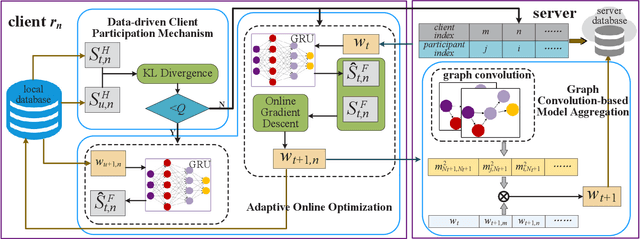
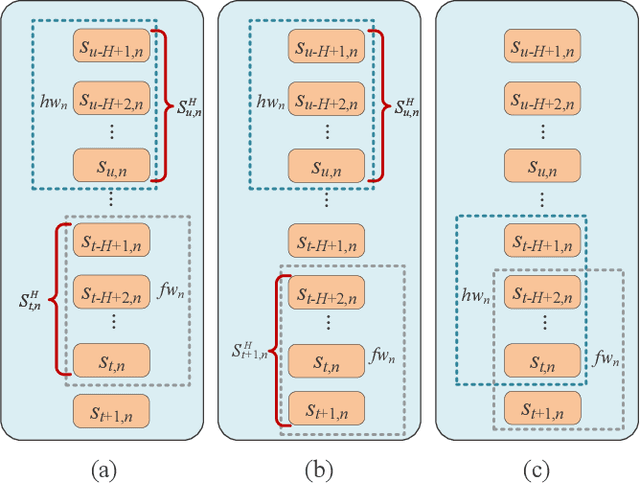


Abstract:Multiple federated learning (FL) methods are proposed for traffic flow forecasting (TFF) to avoid heavy-transmission and privacy-leaking concerns resulting from the disclosure of raw data in centralized methods. However, these FL methods adopt offline learning which may yield subpar performance, when concept drift occurs, i.e., distributions of historical and future data vary. Online learning can detect concept drift during model training, thus more applicable to TFF. Nevertheless, the existing federated online learning method for TFF fails to efficiently solve the concept drift problem and causes tremendous computing and communication overhead. Therefore, we propose a novel method named Resource-Efficient Federated Online Learning (REFOL) for TFF, which guarantees prediction performance in a communication-lightweight and computation-efficient way. Specifically, we design a data-driven client participation mechanism to detect the occurrence of concept drift and determine clients' participation necessity. Subsequently, we propose an adaptive online optimization strategy, which guarantees prediction performance and meanwhile avoids meaningless model updates. Then, a graph convolution-based model aggregation mechanism is designed, aiming to assess participants' contribution based on spatial correlation without importing extra communication and computing consumption on clients. Finally, we conduct extensive experiments on real-world datasets to demonstrate the superiority of REFOL in terms of prediction improvement and resource economization.
Time-FFM: Towards LM-Empowered Federated Foundation Model for Time Series Forecasting
May 23, 2024
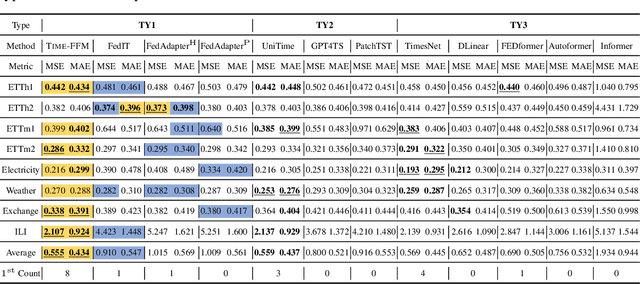
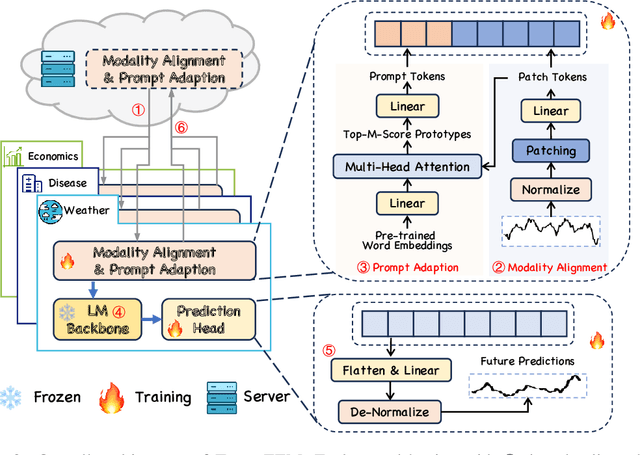
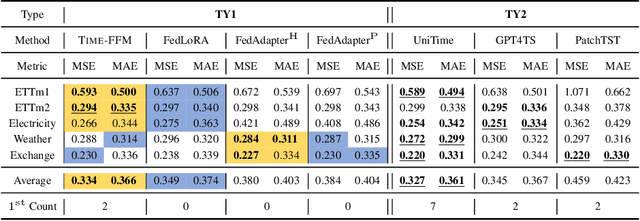
Abstract:Unlike natural language processing and computer vision, the development of Foundation Models (FMs) for time series forecasting is blocked due to data scarcity. While recent efforts are focused on building such FMs by unlocking the potential of language models (LMs) for time series analysis, dedicated parameters for various downstream forecasting tasks need training, which hinders the common knowledge sharing across domains. Moreover, data owners may hesitate to share the access to local data due to privacy concerns and copyright protection, which makes it impossible to simply construct a FM on cross-domain training instances. To address these issues, we propose Time-FFM, a Federated Foundation Model for Time series forecasting by leveraging pretrained LMs. Specifically, we begin by transforming time series into the modality of text tokens. To bootstrap LMs for time series reasoning, we propose a prompt adaption module to determine domain-customized prompts dynamically instead of artificially. Given the data heterogeneity across domains, we design a personalized federated training strategy by learning global encoders and local prediction heads. Our comprehensive experiments indicate that Time-FFM outperforms state-of-the-arts and promises effective few-shot and zero-shot forecaster.
Personalized Federated Learning for Spatio-Temporal Forecasting: A Dual Semantic Alignment-Based Contrastive Approach
Apr 04, 2024



Abstract:The existing federated learning (FL) methods for spatio-temporal forecasting fail to capture the inherent spatio-temporal heterogeneity, which calls for personalized FL (PFL) methods to model the spatio-temporally variant patterns. While contrastive learning approach is promising in addressing spatio-temporal heterogeneity, the existing methods are noneffective in determining negative pairs and can hardly apply to PFL paradigm. To tackle this limitation, we propose a novel PFL method, named Federated dUal sEmantic aLignment-based contraStive learning (FUELS), which can adaptively align positive and negative pairs based on semantic similarity, thereby injecting precise spatio-temporal heterogeneity into the latent representation space by auxiliary contrastive tasks. From temporal perspective, a hard negative filtering module is introduced to dynamically align heterogeneous temporal representations for the supplemented intra-client contrastive task. From spatial perspective, we design lightweight-but-efficient prototypes as client-level semantic representations, based on which the server evaluates spatial similarity and yields client-customized global prototypes for the supplemented inter-client contrastive task. Extensive experiments demonstrate that FUELS outperforms state-of-the-art methods, with communication cost decreasing by around 94%.
Online Spatio-Temporal Correlation-Based Federated Learning for Traffic Flow Forecasting
Feb 17, 2023Abstract:Traffic flow forecasting (TFF) is of great importance to the construction of Intelligent Transportation Systems (ITS). To mitigate communication burden and tackle with the problem of privacy leakage aroused by centralized forecasting methods, Federated Learning (FL) has been applied to TFF. However, existing FL-based approaches employ batch learning manner, which makes the pre-trained models inapplicable to subsequent traffic data, thus exhibiting subpar prediction performance. In this paper, we perform the first study of forecasting traffic flow adopting Online Learning (OL) manner in FL framework and then propose a novel prediction method named Online Spatio-Temporal Correlation-based Federated Learning (FedOSTC), aiming to guarantee performance gains regardless of traffic fluctuation. Specifically, clients employ Gated Recurrent Unit (GRU)-based encoders to obtain the internal temporal patterns inside traffic data sequences. Then, the central server evaluates spatial correlation among clients via Graph Attention Network (GAT), catering to the dynamic changes of spatial closeness caused by traffic fluctuation. Furthermore, to improve the generalization of the global model for upcoming traffic data, a period-aware aggregation mechanism is proposed to aggregate the local models which are optimized using Online Gradient Descent (OGD) algorithm at clients. We perform comprehensive experiments on two real-world datasets to validate the efficiency and effectiveness of our proposed method and the numerical results demonstrate the superiority of FedOSTC.
Exploring the Distributed Knowledge Congruence in Proxy-data-free Federated Distillation
Apr 15, 2022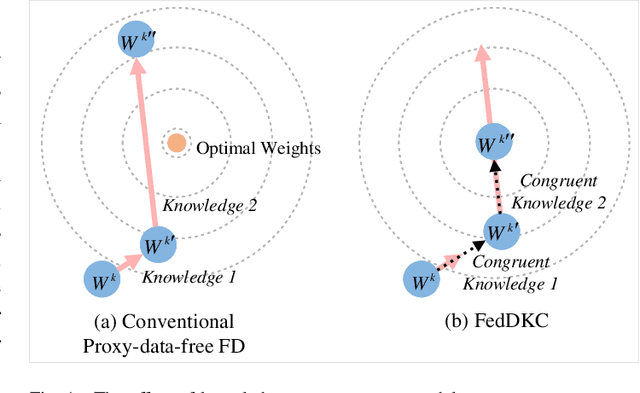
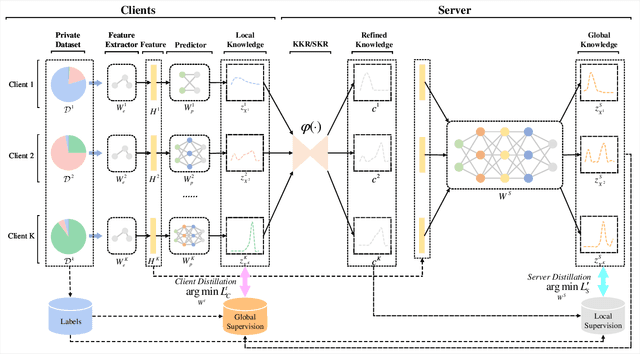


Abstract:Federated learning (FL) is a distributed machine learning paradigm in which the server periodically aggregates local model parameters from clients without assembling their private data. Constrained communication and personalization requirements pose severe challenges to FL. Federated distillation (FD) is proposed to simultaneously address the above two problems, which exchanges knowledge between the server and clients, supporting heterogeneous local models while significantly reducing communication overhead. However, most existing FD methods require a proxy dataset, which is often unavailable in reality. A few recent proxy-data-free FD approaches can eliminate the need for additional public data, but suffer from remarkable discrepancy among local knowledge due to model heterogeneity, leading to ambiguous representation on the server and inevitable accuracy degradation. To tackle this issue, we propose a proxy-data-free FD algorithm based on distributed knowledge congruence (FedDKC). FedDKC leverages well-designed refinement strategies to narrow local knowledge differences into an acceptable upper bound, so as to mitigate the negative effects of knowledge incongruence. Specifically, from perspectives of peak probability and Shannon entropy of local knowledge, we design kernel-based knowledge refinement (KKR) and searching-based knowledge refinement (SKR) respectively, and theoretically guarantee that the refined-local knowledge can satisfy an approximately-similar distribution and be regarded as congruent. Extensive experiments conducted on three common datasets demonstrate that our proposed FedDKC significantly outperforms the state-of-the-art (accuracy boosts in 93.33% comparisons, Top-1 accuracy boosts by up to 4.38%, and Top-5 accuracy boosts by up to 10.31%) on various heterogeneous settings while evidently improving the convergence speed.
 Add to Chrome
Add to Chrome Add to Firefox
Add to Firefox Add to Edge
Add to Edge